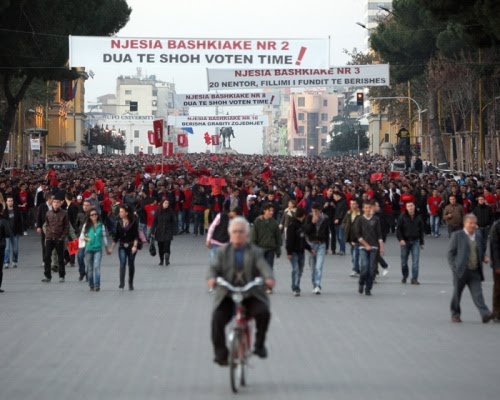Anti-government protest in Albania
* From: NewsCore
* January 29, 2011 2:57AM
Albania Politics Opposition


Flowers lie in front of the Prime Minister's office in Tirana, Albania as police officers seal off a planned opposition protest march / AP Source: AP
TENS of thousands of demonstrators have started a silent protest in the Albanian capital Tirana, a week to the day after clashes during an opposition rally killed three.
The demonstrators, headed by the leadership of the opposition Socialists and the families of the victims, started a march on the government buildings. People continued to pour into the downtown area near the government, bringing traffic in central Tirana to a standstill. Many protesters carried flowers.
In the square in front of the government, a stage was set up, and opposition leader Edi Rama, the mayor of the capital, was expected to address the crowds later.
Pictures of the three fatalities of the last rally were placed on stage, with the word "justice" written on them in Albanian and English.
There was a huge police presence in the capital, with two cordons surrounding the government buildings and 30 elite officers guarding the entrance.
* From: NewsCore
* January 29, 2011 2:57AM
Albania Politics Opposition


Flowers lie in front of the Prime Minister's office in Tirana, Albania as police officers seal off a planned opposition protest march / AP Source: AP
TENS of thousands of demonstrators have started a silent protest in the Albanian capital Tirana, a week to the day after clashes during an opposition rally killed three.
The demonstrators, headed by the leadership of the opposition Socialists and the families of the victims, started a march on the government buildings. People continued to pour into the downtown area near the government, bringing traffic in central Tirana to a standstill. Many protesters carried flowers.
In the square in front of the government, a stage was set up, and opposition leader Edi Rama, the mayor of the capital, was expected to address the crowds later.
Pictures of the three fatalities of the last rally were placed on stage, with the word "justice" written on them in Albanian and English.
There was a huge police presence in the capital, with two cordons surrounding the government buildings and 30 elite officers guarding the entrance.


